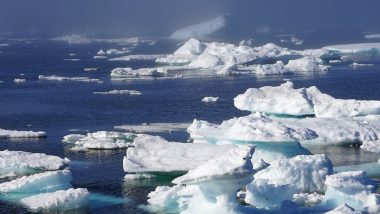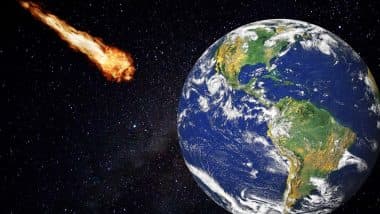A group of UK scientists found out that 28 trillion tonnes of ice has disappeared from the surface of the Earth since 1994. To identify the impact of global warming on Earth, scientists from Leeds and Edinburgh universities and University College London analyzed satellite surveys of glaciers, mountains, and ice sheets between 1994 and 2017. The scientists described the loss of ice as "staggering". They also said that melting glaciers and ice sheets could result in sea levels to rise dramatically reaching a meter by the end of the century. Their review paper was published in the journal Cryosphere Discussions. Global Warming: Norway's Arctic Archipelago Svalbard Records Highest-Ever Temperature at 21.7 Degrees Celsius.
Professor Andy Shepherd, director of Leeds University's Center for Polar Observation and Modelling, told the Guardian, "To put that in context, every centimetre of sea-level rise means about a million people will be displaced from their low-lying homelands."
The loss of ice could have other severe consequences, including major disruption to the biological health of Arctic and Antarctic waters and reducing the planet's ability to reflect solar radiation back into space. The findings match the worst-case-scenario predictions outlined by the United Nation's Intergovernmental Panel on Climate Change (IPCC), the scientists have confirmed. US Mountain Lakes Turn Green With Algal Bloom Due to Climate Change, Scientists Say Algae Concentration Doubled in Past 70 Years (See Pictures)
Reportedly Shepherd said, "In the past researchers have studied individual areas – such as the Antarctic or Greenland – where ice is melting. But this is the first time anyone has looked at all the ice that is disappearing from the entire planet. What we have found has stunned us." The group wrote, "There can be little doubt that the vast majority of Earth's ice loss is a direct consequence of climate warming."
The findings come a week after researchers at Ohio State University discovered that Greenland experienced a record loss of ice sheet melting away. According to the researchers, the Greenland ice sheet which is the world's second-largest ice body, will continue to lose ice even if global temperatures stop rising. Michalea King, the lead author and researcher at Ohio State University's Byrd Polar and Climate Research Center, said in a press release, "What we've found is that the ice that's discharging into the ocean is far surpassing the snow that's accumulating on the surface of the ice sheet."
(The above story first appeared on LatestLY on Aug 24, 2020 02:13 PM IST. For more news and updates on politics, world, sports, entertainment and lifestyle, log on to our website latestly.com).













 Quickly
Quickly





















